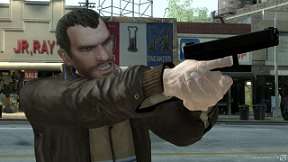Let's Prevent Mass Violence by Making it Illegal to Fire People
For those asking the government to intervene to stop violent "triggers," where is the line?

Joe Nocera at the New York Times has thrown together a perfunctory, by-the-numbers op-ed fretting about violence in film and video games that could have been written at any point in the last 20 years. I would go far to say that it has been written repeatedly for the past 20 years.
Using a Die Hard marathon and his own self-described "poking around the world of gun-crazed movies and other media" (a turn of phrase that marks Nocera as a completely unengaged tourist in the world he ostensibly lives in), Nocera calls for an assault weapons ban (without a definition of an assault weapon, of course) and engages in the hardcore research to make his case against entertainment violence by calling pop psychologists who agree with him to get quotes. Notably, his nod to "fairness" is to call a movie industry representative to speak on behalf of researchers who disagree there's a link between entertainment and violence and not actually talk to such researchers. He rather simply (and simplistically) declares that every parent understands "instinctively" that violent media causes children to become more hostile.
He gives the barest of acknowledgment that we have the First and Second Amendment to restrain the government from doing what he probably thinks is best for all of us and the slippery slope of censorship:
Craig Anderson, a psychologist at Iowa State University, told me that children who watch even something as seemingly benign as Woody Woodpecker cartoons — in which Woody often pecks on someone's head — can become temporarily more aggressive. "If you are going to start to ban media violence, where do you stop?" he asked.
Violent video games and movies, he went on to say, are certainly not the only factor that can lead someone to commit an act of gun violence. "If someone has no other risk factors, he can play Grand Theft Auto all day and never commit a violent act. But if he has a number of the other risk factors. …" Anderson let the thought hang.
Wondering why Anderson let that thought hang? Clearly we are expected to conclude that Grand Theft Auto would be the trigger to cause a violent response. But that sentence can be completed with "… then any sort of conflict in his life could trigger a violent act."
Conflict like getting fired. Violent, crazy guys really don't like getting fired from their jobs. Christopher Dorner notably did not. Andrew Engeldinger of Accent Signage Systems in Minneapolis did not like getting fired in September and killed five people (and himself). Anyone raising the specter of censorship of the media on the basis of trying to eliminate "triggers" that cause people with mental issues to snap can't stop there. Many men are able to psychologically handle the stress of being fired, but if they have a number of other risk factors … well, I'll just let that thought hang.
According to Pew Research study from 2008, 97 percent of American teens play video games. That's somewhere around 40 million (depending on how you define a teen). Even if the Sandy Hook Elementary shootings could be tied back to violent video games, or Nehemiah Griego in New Mexico allegedly murdering his family in January, these guys are statistically insignificant when compared to the entire population of those who play video games. So when critics like Nocera stroke their chins and worry about guns and violent media, it's appropriate to wonder why exactly their calls for government intervention end there. The same logic could be used to forbid employers from firing troubled and troublesome workers.


Show Comments (53)